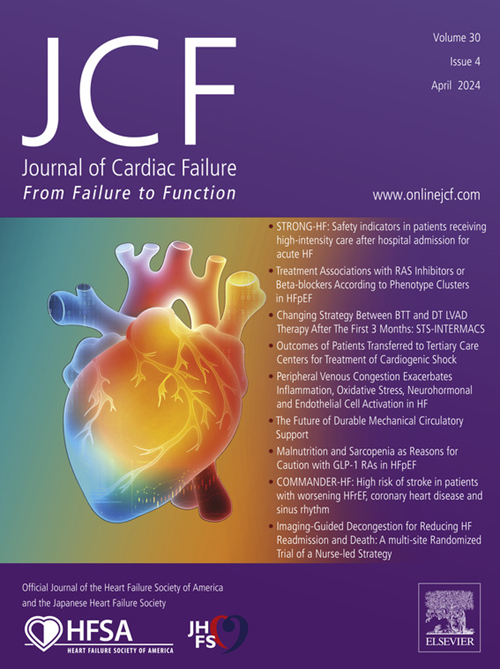梗阻性肥厚性心肌病的年龄或诊断时间与对马伐卡坦治疗的反应之间的关系:EXPLORER-HCM试验的探索性分析
IF 6.7
2区 医学
Q1 CARDIAC & CARDIOVASCULAR SYSTEMS
引用次数: 0
摘要
背景和目的:在有症状的阻塞性肥厚型心肌病(HCM)患者中,尚不清楚心脏肌球蛋白抑制剂的反应是否随年龄的增长或诊断时间的延长而变化。本研究评估了 EXPLORER-HCM 试验(ClinicalTrials.gov:NCT03470545)中这些亚组对马伐康汀治疗的所有主要、次要和探索性终点的反应:按年龄(≤60 岁 vs. >60 岁)和 HCM 诊断持续时间(≤5 年 vs. >5 年)对患者进行分层。为估算治疗差异并评估年龄和诊断持续时间与治疗的交互作用,采用协方差分析建立连续终点变化模型,采用广义线性模型建立二元终点变化模型:结果:老年患者多为女性(53% 对 29%),致病性/可能致病性 HCM 基因变异发生率较低(17% 对 36%),平均峰值氧耗量(pVO2)较低(17.6 对 21.1 毫升/千克/分钟),NT-proBNP 平均水平较高(817 对 592 纳克/升),但 NYHA 分级和生活质量评分相似。诊断时间长与诊断时间短的患者平均年龄相似(59.0±11.6 岁与 57.9±12.3 岁),但有更多 HCM 家族史(38% 与 16%),NT-proBNP 平均水平更高(938±118 与 494±145 ng/ml)。在峰值氧耗量、NYHA分级或患者报告结果的改善方面,年龄较大和诊断时间较长的患者没有发现差异:结论:在 EXPLORER-HCM 研究中,对于有症状的阻塞性 HCM 患者,无论年龄或诊断时间长短,马伐康坦治疗对所有主要、次要和探索性终点都有相似的益处。本文章由计算机程序翻译,如有差异,请以英文原文为准。
Association Between age or Duration of Diagnosis in Obstructive Hypertrophic Cardiomyopathy and Response to Mavacamten Treatment: Exploratory Analysis of the EXPLORER-HCM Trial
Background and Aims
In patients with symptomatic, obstructive hypertrophic cardiomyopathy (HCM), it is unclear if response to cardiac myosin inhibition varies with older age or a longer duration of diagnosis. This study evaluated the response of these subgroups to mavacamten therapy for all primary, secondary and exploratory endpoints in the EXPLORER-HCM trial (ClinicalTrials.gov: NCT03470545).
Methods
Patients were stratified by age (≤ 60 vs > 60 years) and duration of HCM diagnosis (≤ 5 vs > 5 years). To estimate treatment differences and evaluate age and diagnosis duration by treatment interaction, analysis of covariance was used to model changes in continuous endpoints, and a generalized linear model was used for binary endpoints.
Results
Older patients were more commonly female (53% vs 29%), had lower prevalences of pathogenic/likely pathogenic HCM gene variants (17% vs 36%), lower mean peak oxygen consumption (pVO2) (17.6 vs 21.1 mL/kg/min), and higher mean NT-proBNP levels (817 vs 592 ng/L) but similar NYHA classes and quality-of-life scores. Patients with longer vs shorter diagnosis duration had similar mean ages (59.0 ± 11.6 vs 57.9 ± 12.3 years) but more family histories of HCM (38% vs 16%) and higher mean NT-pro BNP levels (938 ± 118 vs 494 ± 145 ng/mL). No differences were observed in improvement in peak oxygen consumption, NYHA class or patient-reported outcomes among older patients and those with longer durations of diagnosis.
Conclusions
In EXPLORER-HCM, mavacamten treatment had a similar benefit for all primary, secondary and exploratory endpoints in patients with symptomatic, obstructive HCM, regardless of age or duration of diagnosis.
求助全文
通过发布文献求助,成功后即可免费获取论文全文。
去求助
来源期刊

Journal of Cardiac Failure
医学-心血管系统
CiteScore
7.80
自引率
8.30%
发文量
653
审稿时长
21 days
期刊介绍:
Journal of Cardiac Failure publishes original, peer-reviewed communications of scientific excellence and review articles on clinical research, basic human studies, animal studies, and bench research with potential clinical applications to heart failure - pathogenesis, etiology, epidemiology, pathophysiological mechanisms, assessment, prevention, and treatment.
 求助内容:
求助内容: 应助结果提醒方式:
应助结果提醒方式:


